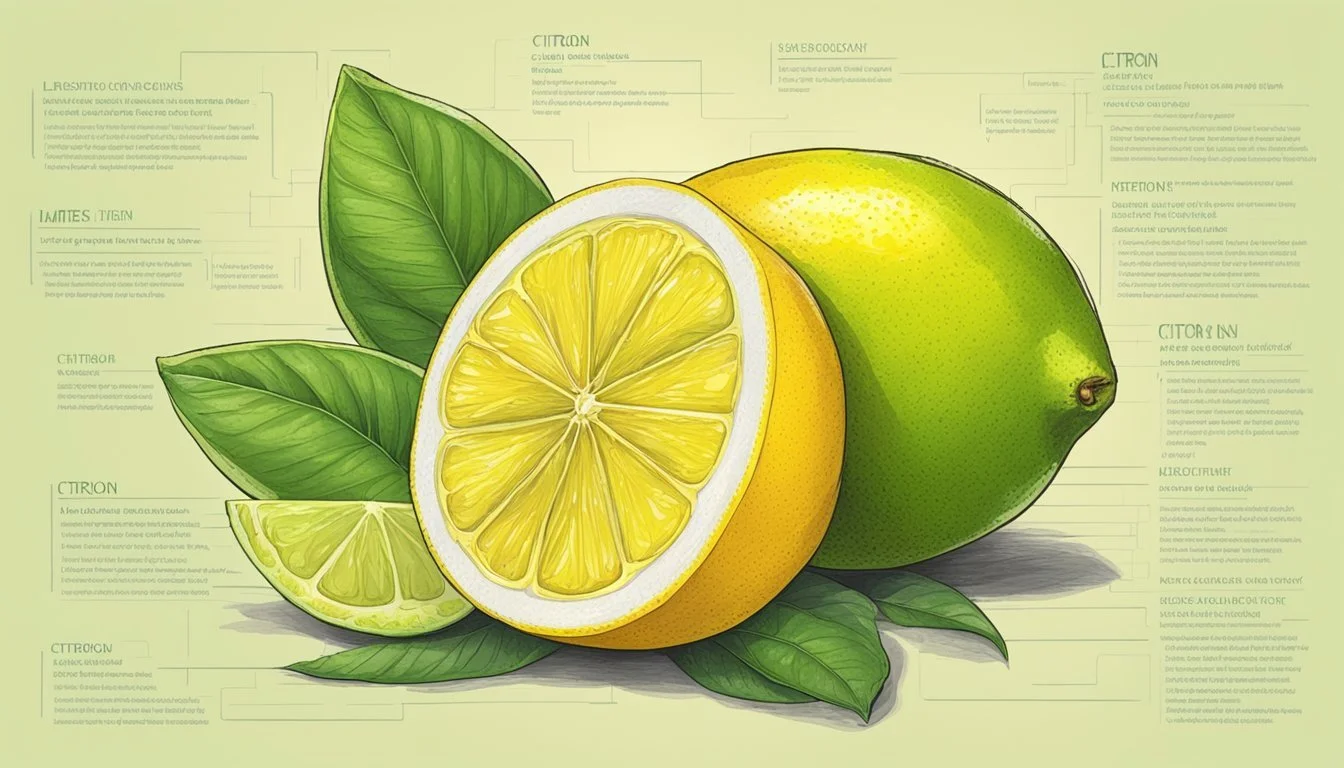Citron Substitutes
Best Alternatives for Your Recipes
Substituting candied citron in recipes is sometimes necessary when this specialty ingredient, known for its sweet-tart flavor and floral aroma, is not readily available. Candied citron, made from the thick peel of the citron fruit, is a traditional component in various baked goods, particularly in holiday fare like fruitcakes and panettone. While its unique taste is difficult to replicate precisely, there are several alternatives that can impart a similar citrus essence and sweet chewiness to desserts.
Lemon and orange peels stand out as the most accessible substitutes. Lemon zest, in particular, provides a zesty and aromatic citrus flavor that complements many recipes that originally call for candied citron. Orange peel, noted for its sweetness and vibrancy, can also be candied at home and used as an adequate replacement. Dried apricots, with their inherent sweetness and slight tartness, can be chopped finely and provide a textural contrast in baked recipes, mimicking the chewy characteristic of candied citron.
When using these substitutes, it's crucial to adjust quantities to taste, as the intensity of flavor can vary. Home cooks should also consider the texture and moisture content of these alternatives since it can affect the final outcome of the dish. The goal is to achieve a harmonious balance of flavors that pays homage to the traditional use of candied citron while utilizing available ingredients.
Understanding Citron and Its Uses
The reader should be aware that citron is a distinctive citrus fruit whose flavorful rind is prized in various culinary traditions, especially in baking and confectionery.
The Role of Citron in Recipes
Citron, with its distinctive tart and slightly sweet flavor, plays a unique role in recipes. In desserts such as fruitcakes, panettone, and stollen, the fruit's thick and aromatic rind is often candied to add depth. This candied citron provides not only a burst of flavor but also a delightful chewy texture.
Traditional Citron Preparations
Traditional preparations of citron usually involve preserving the peel through a candying process. Slices or pieces of citron peel are simmered in sugar syrup until they become translucent and are then coated with sugar. The resulting candied citron is often used as a decorative and flavorful addition to baked goods.
Culinary Importance of Citron
In the culinary world, the importance of citron cannot be overstated. Its zest, which contains aromatic oils, imparts a potent citrusy fragrance and taste to a myriad of dishes. Although not juicy, the citron's peel is the star ingredient in making marmalade and flavoring both sweet and savory creations.
Nutritional Value of Citron
Citron is not just valued for its flavor; it also offers nutritional benefits. It contains vitamin C and other beneficial compounds found in citrus fruits, although one should note that it is more often used in its candied form in cooking, which increases its sugar content.
Citron in Cultural Cuisines
Different cultures have embraced citron in their cuisines. In Jewish culture, for instance, citron is used during the Sukkot festival. Italian and German confections prominently feature citron, especially around the holidays when cakes, muffins, and traditional desserts are richly flavored with this citrus fruit's aromatic peel.
Exploring Citron Substitutes
When a recipe calls for candied citron and one either cannot find it or needs an alternative due to dietary restrictions or allergies, several substitutes can seamlessly take its place. Here are practical options broken down into categories.
Why Substitute Citron?
Citron, a large, fragrant citrus fruit with a thick rind, is not always readily available in every grocery store. Moreover, some individuals may have dietary restrictions or allergies that necessitate a replacement, or they might simply prefer the taste or texture of a different ingredient.
Fruit-Based Alternatives
Citrus Peels:
Lemon Peel: With a similar citrus profile, grated lemon rind creates lemon zest, which can mimic the aromatic qualities of candied citron.
Orange Peel: The readily available peel of an orange offers a sweet yet tart flavor, perfect for replacing candied citron.
Grapefruit and Lime: These citrus fruits can also lend their zest when a more tangy note is desired.
Candied Fruits:
Candied Orange: A sweet alternative providing a similar texture to candied citron.
Candied Pineapple: Its tropical flavor can complement sweets like cakes and cookies.
Clementine Slices: These can be candied at home and used for a delicate substitution.
Fresh and Dried Fruits:
Dates: Their natural sweetness can substitute for citron's candied version when chopped finely.
Dried Apricots: They offer a sweet and slightly tart flavor that works well in baked goods.
Non-Fruit Substitutes
Nuts: Almonds, pistachios, or chestnuts can be used for textural contrast in recipes.
Candied Ginger: It can add a spicy kick to recipes needing a substitute for candied citron.
Poppy Seeds: For a flavor twist and some crunch, these seeds can be an unexpected yet delightful substitute.
Homemade Citron Substitutes
One can create a homemade substitute for candied citron using a simple sugar syrup. Combine equal parts granulated sugar and water, bring to a simmer, and add citrus peels of choice such as lemon or orange. Simmer until the peels are translucent, then roll in sugar and allow to dry.
Using Citron Substitutes in Baking
When using substitutes, consider the texture and moisture content relative to candied citron. For example, nuts or seeds may require a different approach than candied or fresh fruits. Lemon juice can be added to enhance the citrus flavor if using less aromatic substitutes like dried fruits or nuts. Always ensure that the size and consistency of the substitute align well with the intended baked goods such as cakes, muffins, or cookies.
Creative Uses of Citron Alternatives
Replacing citron in recipes can open a diverse palette of flavors while maintaining the integrity of the dish. By using different citrus fruits and creative substitutes, one can adapt and enhance a variety of culinary creations.
Substitutes in Sweet Dishes
Citron, known for its intense citrus flavor, is a staple in many sweet concoctions. When citron is unavailable, lemon zest can be used as a direct substitute, offering a similar tartness and citrus aroma to enhance desserts like ice cream or panettone. Orange peel, finely chopped or grated, can be mixed into baking recipes, imparting a delicate, sweet twist to traditional fruitcakes or stollen.
Baking: Lemon zest in cookies, orange peel in cakes.
Dessert: Orange peel sprinkled over dark chocolate.
Savory Applications for Substitutes
In savory dishes, citron's absence can be compensated with alternatives that bring both sweet and citrus notes. Golden raisins, plumped in lemon juice, can be added to sauces or marinades to complement the flavors of meat and fish dishes. The zest of citrus fruits can lend a vibrant, fresh undertone to enhance the natural flavors of ingredients.
Sauce: Lemon juice with raisins.
Marinade: Orange zest for meats.
Beverages and Cocktails
Citrus fruits are at the heart of many cocktails, offering a refreshing zestiness. In the case of citron vodka being unavailable, plain vodka can be infused with lemon or orange zest to recreate the desired citrus profile in drinks such as a cosmopolitan. Lemon juice is also a potent substitute, providing both the sour and citrus elements necessary for balanced cocktail flavors.
Cocktails: Vodka with lemon zest.
Beverages: Orange juice in lemonade.
Specialty and Holiday Treats
Around the holidays, traditional recipes call for specific ingredients like candied citron. However, when alternative routes are needed, dried apricots chopped into small pieces provide a sweet, fruity component suitable for holiday treats. These can be especially delightful in fruitcakes or bread recipes, adding a chewy texture and a tartness that pairs well with the sweetness of such seasonal desserts.
Holiday Treats: Dried apricots in fruitcakes.
Specialty: Chopped orange peel in stollen.
Preserving and Storing Substitutes
Proper storage techniques are crucial to maintaining the quality and extending the shelf life of candied citrus substitutes. This section elaborates on methods like canning, drying, and freezing, while addressing their shelf life and hygienic handling.
Canning and Jar Storage
To preserve candied citrus substitutes such as lemon or orange peel, one may utilize canning. Place the candied peels in airtight containers and store them in a cool, dry place. It is important to ensure that jars are sterilized before use to prevent contamination and maintain food safety.
Drying and Freezing Techniques
Dehydrating citrus substitutes consolidates their flavors and extends shelf life. They can be laid on drying racks and stored in a cool, dark place. Freezing is a suitable method for long-term storage; citrus substitutes can be frozen in airtight bags or containers, with freezer storage preventing spoilage.
Shelf Life Considerations
The shelf life of candied citrus substitutes varies. Typically, properly canned items can last up to a year. Dried peels should be used within six months for optimal flavor, and frozen substitutes can last up to a year. Always label containers with the expiration date to monitor their quality.
Handling Substitutes Hygienically
Maintaining cleanliness is essential when managing food substitutes to avoid cross-contamination. One should use clean utensils when handling the substitutes and store them separately from raw foods. Regularly inspect the storage area for cleanliness to assure the maintenance of food safety standards.
Health and Dietary Considerations
When selecting citron substitutes, individuals must consider their health needs and dietary restrictions. The following subsections address specific aspects such as caloric content, allergies, nutritional benefits, and their compatibility with various diets.
Caloric and Sugar Content
Honey, maple syrup, and molasses are natural sweeteners often used as substitutes for citron to add a touch of sweetness to dishes. However, they vary significantly in caloric and sugar content, which can be a concern for health-conscious individuals. For example:
Honey: High in fructose, it provides a sweet flavor and has about 64 calories per tablespoon.
Maple Syrup: Contains a lower calorie count than honey, with around 52 calories per tablespoon.
Molasses: Dense and nutrient-rich, it has about 58 calories per tablespoon.
Allergy and Sensitivity Information
Individuals with citrus allergies need substitutes that will not trigger reactions. Ingredients such as vinegars and tamarind paste can serve as replacements without containing the allergens present in citrus fruits like grapefruits and oranges. Allergies to these substitutes are less common, but one should always check for personal sensitivities.
Substitutes Rich in Vitamin C
Citrus fruits are well-known for their vitamin C content, a vital nutrient for health. In the absence of citrus, one can opt for replacements that are also rich in vitamin C. For example, bell peppers and kiwifruit are excellent sources of vitamin C and can be integrated into diets to compensate for the absence of citrus fruits.
Incorporating Substitutes into Special Diets
For those with dietary restrictions, selecting appropriate citron substitutes is crucial. Vinegars and tamarind have minimal caloric content and can be suitable for low-calorie diets. Natural sweeteners like honey and maple syrup can be part of diets if used in moderation. However, diabetics and individuals on sugar-restricted diets should prefer substitutes with lower sugar quantities or opt for sugar-free alternatives.
Sourcing Citron Substitutes
Finding a substitute for citron boils down to knowing where to look and what to look for. One can explore various avenues such as specialty retailers, online platforms, local markets, and even their own garden.
Specialty Stores and Online Vendors
For those seeking alternatives to citron, specialty stores offer a range of options. These stores typically stock unique items like citron peel or candied citron for baking. For convenience, online shopping platforms can be a treasure trove, providing access to a variety of citron substitutes. Online vendors often carry a more extensive selection than physical stores and deliver right to the doorstep.
Recommended Online Citron Substitutes:
Candied lemon or orange peel
Lemon zest or orange zest
Dried citron slices
Local Markets and Seasonal Availability
Local produce at farmers markets can be a source of fresh, seasonal substitutes such as fresh lemon or orange rind. The seasons determine the availability of these citron alternatives, with certain times of the year offering a greater selection than others. Visitors to these markets can typically find:
Seasonal Citron Substitutes Found at Farmers Markets:
Fresh lemon rind (Spring/Summer)
Orange peel (Fall/Winter)
Growing Your Own Substitutes
For individuals with a green thumb, gardening provides the opportunity to grow citron substitutes like lemon or orange trees. Starting from seeds or young plants, one can cultivate these substitutes over time. This not only ensures a fresh supply but also gives the gardener control over the growing conditions and harvest timing.
Steps for Growing Citron Substitutes:
Purchase seeds or saplings of desired citrus substitutes.
Plant in well-draining soil with ample sunlight exposure.
Regularly water and maintain to encourage healthy growth.
Harvest peels or zests as needed for recipes.
Tips and Tricks for Substituting Citron
Substituting citron in recipes requires paying attention to taste, texture, and visual appeal. This section explores how to balance those aspects using alternative ingredients.
Adjusting Recipes for Taste and Texture
In baking, the distinct tartness and chewy texture of candied citron can be mimicked with alternatives like lemon zest, which lends a similar citrus flavor. When replacing citron slices, consider the amount of sugar in the recipe, as substitutes may vary in sweetness. For a closely matched texture, candied orange or candied ginger can be finely chopped to resemble the soft yet firm bite of traditional candied citron.
Enhancing Flavors with Citron Substitutes
To enhance the flavor profile when using substitutes for citron, try adding a small amount of lemon juice for added tartness. This can complement the zest or other candied fruits in your recipe. Incorporating zest not only mimics the original flavor but also adds an aromatic quality that can transform a recipe from good to great.
Visual Appeal with Substitutes
For the translucent, jewel-like appearance of citron, consider using golden raisins or chopped dried apricots. These substitutes provide the bright, inviting color and glossy texture that candied citron is known for. When baked into goods like fruitcakes, they offer a visual appeal that is both rustic and enticing.
Experimenting with New Combinations
Culinary creativity thrives on innovation, and experimenting with different citron substitutes can lead to exciting new flavor profiles. Mix and match candied fruits, zest, and dried fruits within your recipes to discover unique combinations that delight the palate. Through trial and refinement, you may even develop a signature blend that sets your baking apart.
FAQs About Citron and Its Substitutes
In this section, readers will find information addressing common concerns about using citron and its alternatives. The focus is on the use of candied citron, the health aspects of citron, and practical advice for those experimenting with substitutes for the first time.
Common Questions About Candied Citron
What can be used in place of candied citron in recipes?
Lemon or orange peel: These can be candied as alternatives, offering a similar texture but slightly different flavor profiles.
Zucchini or summer squash: When candied, these can mimic the texture of candied citron and are a suitable alternative for those with dietary restrictions.
Is it possible to use fresh citron as a substitute for candied citron?
No, fresh citron has a different moisture content and texture. Candied citrus peels are a better match, as the candying process preserves and sweetens the rind.
Queries Regarding Health Benefits
Does citron provide any significant health benefits?
Citron is rich in vitamin C and provides similar health benefits to other citrus fruits. It's a good addition to one's diet when it comes to boosting immunity.
What substitutes might be preferred for individuals with dietary restrictions?
One might consider using zucchini or summer squash as they do not contain the allergens that some citrus fruits possess. Additionally, they offer a range of nutrients beneficial for a healthy diet.
Tips for First-Time Users of Substitutes
What should a first-time user consider when using zucchini as a substitute in baking?
One should consider texture and moisture content; when used in baked goods like pancakes or granola, zucchini should be thoroughly dried or desiccated to prevent sogginess.
What is a simple way to use citron substitutes?
Alternatives like lemon or orange zest can be used directly in place of citron zest. For candied versions, choose alternatives that can retain their structure and not melt away during cooking, like candied lemon or orange peel.
Conclusion
In the search for candied citron substitutes, one has a variety of options that cater to different taste preferences and dietary restrictions. Dried apricots serve as a sweet and fruity alternative, with a tangy profile imparting a unique twist to baked goods. Cutting these into small pieces allows them to integrate well into recipes like fruitcakes and muffins.
Citrus peels, specifically from lemons and oranges, are readily available and can be used in zest form to infuse a similar citrus flavor. The rind of lemons—when grated as lemon zest—or orange peel can act as a flavorful stand-in for candied citron.
Additionally, lemon juice offers a liquid substitute that also provides vitamin C and antioxidants. While not providing the same texture, it still contributes a citrus note to dishes.
To summarize, cooks have multiple alternatives when candied citron is not accessible, allowing them to maintain the integrity of their dishes with a little creativity. Each substitute comes with its own characteristics and contributions to the desired recipe, whether it is the sweet and tart profile of dried fruits or the rich essence of citrus peels. Through these substitutions, one ensures the continuity of flavor and enjoyment in their culinary creations.
References
Land O'Lakes, an established name in the culinary world, provides a solution for substituting semi-sweet baking chocolate. They suggest using unsweetened baking chocolate with added granulated sugar as an alternative.
The blog by Miss Vickie offers a variety of citrus-based options for replacing candied citron, highlighting readily available substitutes such as lemon rind and orange peel, which can impart a similar flavor to dishes, especially desserts.
Alternative dried fruits, such as apricots, cranberries, and cherries, are presented as valuable substitutes for candied citron in baking. These alternatives can enhance sweetness, texture, and color in various recipes.
FoodSubs suggests using the thick rind of the citron to make marmalade or using its zest as a close substitute for lemon zest, which can be utilized in a range of recipes requiring citrus elements.
Discovering Delicious Candied Citron Substitutes for Your Recipes focuses on alternatives to candied citron in cooking. It points out that dried apricots, with their slightly tart profile, can serve as a sweet and fruity substitution, especially suitable for baked goods like fruitcakes and muffins.
These references offer practical solutions for substituting citron and demonstrate the versatility achievable with various ingredients within the culinary field. They enrich the reader's knowledge, providing a solid base for recipe adaptation.
About the Author
The author, recognized for a profound understanding of culinary arts, is an esteemed food writer and an advocate for versatile home cooking. They are celebrated for their ability to demystify complex cooking processes and make them accessible to the everyday chef. With a keen sense of taste and a passion for exploring alternative ingredients, the author specializes in offering creative substitutions that maintain the integrity of the original recipe while catering to diverse palates and dietary restrictions.
Expertise: Culinary Arts, Recipe Development
Education: Bachelor's Degree in Culinary Science
Experience: Over a decade in food writing and editing
As a diligent researcher, the author ensures that their recommendations are not only practical but also tested, allowing readers to trust their guidance when navigating ingredient substitutions. Focused on the subject of citron substitutes, their latest article provides readers with a comprehensive list of alternatives, drawing on a wealth of culinary experience and meticulous analysis of available resources.
Area of Interest Contributions Ingredient Substitution A robust portfolio of articles offering culinary alternatives Home Cooking Workshops and webinars aimed at improving kitchen skills Food Preservation Publications on sustainable food storage solutions
Through clear communication, the author offers a wealth of knowledge to both novice and experienced cooks, affirming their position as a reliable source within the culinary community.










